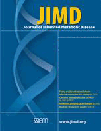Transferrin hypoglycosylation in hereditary fructose intolerance: Using the clues and avoiding the pitfalls
Communicating editor: Jaak Jaeken
Online citation: JIMD Short Report #047 (2007) Online
Electronic Supplementary Material:
The online version of this article (doi:10.1007/s10545-007-0569-z) contains supplementary material, which is available to authorized users.
Summary
Hereditary fructose intolerance (HFI) is caused by a deficiency of aldolase B due to mutations of the ALDOB gene. The disease poses diagnostic problems because of unspecific clinical manifestations. We report three cases of HFI all of whom had a chronic disease with neurological, nephrological or gastroenterological symptoms, whereas nutritional fructose intolerance, the pathognomonic sign of HFI, was apparent only in retrospect. In all patients a hypoglycosylated pattern of transferrin isoforms was found but was misinterpreted as a sign of CDG Ix. The correct diagnosis was achieved with marked delay (26, 36 and 24 months, respectively) by sequencing of the ALDOB gene two common mutations were identified on both alleles or on one (A150P/A175D, A150P/− and A150P/A175D). The diagnosis was further supported by normalization of transferrin isoforms on a fructose-free diet. Data available in two patients showed that following the fructose restriction the type I pattern of carbohydrate-deficient transferrin detectable on fructose-containing diet disappeared after 3–4 weeks. These cases illustrate that in the first years of life HFI may show misleading variability in clinical presentation and that protein glycosylation analysis such as transferrin isofocusing may give important diagnostic clues. However, care should be taken not to misinterpret the abnormal results as CDG Ix as well as to remember that a normal profile does not exclude HFI due to the possibility of spontaneous fructose restriction in the diet. The presented data also emphasize the usefulness of ALDOB mutation screening for diagnosis of HFI.




